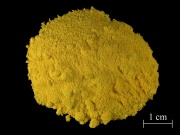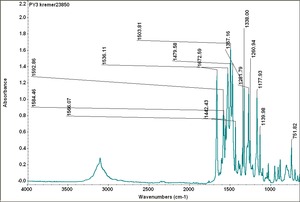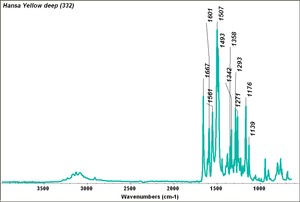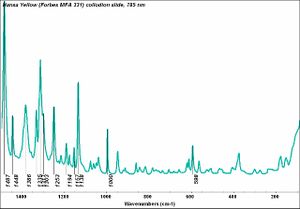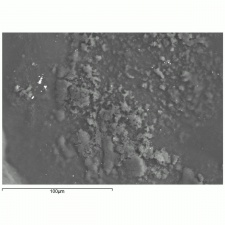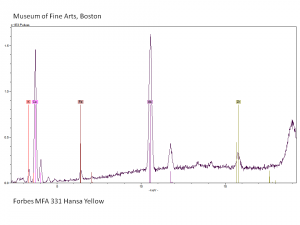Difference between revisions of "Hansa yellow"
| (9 intermediate revisions by 5 users not shown) | |||
| Line 1: | Line 1: | ||
[[File:Hansa yellow.jpg|thumb|Hansa yellow]] | [[File:Hansa yellow.jpg|thumb|Hansa yellow]] | ||
== Description == | == Description == | ||
| + | [[File:Hansayellow C100x.jpg|thumb|Hansa yellow at 100x (visible light left; UV light right)]] | ||
| + | Originally a brand name [Hoechst AG] for a series of bright yellow synthetic organic pigments. Hansa yellow is now a commonly used designation for this class of yellow [[arylide|monoazo]] colorants. They are also called arylamide yellows. Developed in Germany in the early 20th century, Hansa yellow was the first permanent organic yellow pigment. It was available for artists paints about 1915. The insoluble colorants have good lightfastness and weather resistance but are susceptible to bleeding in some media and discoloration when heated. They were commonly used as inexpensive substitutes for cadmium yellows in paints, plastics, rubber and coated paper. Recently, they have been superseded by diarylide and vat yellows. | ||
| − | + | * Hansa R is a reddish yellow. | |
| − | + | * Hansa G is a greenish-yellow. | |
| − | Hansa R is a reddish yellow. | ||
| − | |||
| − | Hansa G is a greenish-yellow. | ||
A number preceding the G indicates the degree of toning, i.e., 10G is greener than 5G. | A number preceding the G indicates the degree of toning, i.e., 10G is greener than 5G. | ||
| − | [[[SliderGallery rightalign| | + | [[[SliderGallery rightalign|PY3 kremer23850.TIF~FTIR PY3(MFA)|Hansa Yellow 332.TIF~FTIR Forbes 332(MFA)|Hansa Yellow (Forbes MFA 331) collodion slide, 785 nm (640x445).jpg~Raman|f331sem.jpg~SEM|f331edsbw.jpg~EDS|Slide1 FC331.PNG~XRF]]] |
== Synonyms and Related Terms == | == Synonyms and Related Terms == | ||
arylamide yellow; Monolite yellow; Talens' yellow; Pigment Yellow 1, 3, 5 and 10; Hansagelb (Deut.); jaune solide (Fr.) | arylamide yellow; Monolite yellow; Talens' yellow; Pigment Yellow 1, 3, 5 and 10; Hansagelb (Deut.); jaune solide (Fr.) | ||
| + | == Comparisons == | ||
| − | = | + | {| class="wikitable" |
| − | + | ! Pigment number !! Manufacture !! Pigment name !! Manufacture CI number !! Comments | |
| − | + | |- | |
| − | + | | PY003|| Kremer|| studio yellow|| 23850 || | |
| − | + | |- | |
| − | + | | Forbes 332 || unknown|| Hansa yellow deep|| unknown manufacturer || | |
| + | |} | ||
| − | == | + | ==Resources and Citations== |
* R. J. Gettens, G.L. Stout, ''Painting Materials, A Short Encyclopaedia'', Dover Publications, New York, 1966 | * R. J. Gettens, G.L. Stout, ''Painting Materials, A Short Encyclopaedia'', Dover Publications, New York, 1966 | ||
| Line 41: | Line 42: | ||
* Richard S. Lewis, ''Hawley's Condensed Chemical Dictionary'', Van Nostrand Reinhold, New York, 10th ed., 1993 | * Richard S. Lewis, ''Hawley's Condensed Chemical Dictionary'', Van Nostrand Reinhold, New York, 10th ed., 1993 | ||
| − | * Art and Architecture Thesaurus Online, | + | * Art and Architecture Thesaurus Online, https://www.getty.edu/research/tools/vocabulary/aat/, J. Paul Getty Trust, Los Angeles, 2000 |
[[Category:Materials database]] | [[Category:Materials database]] | ||
Latest revision as of 14:41, 30 August 2022
Description
Originally a brand name [Hoechst AG] for a series of bright yellow synthetic organic pigments. Hansa yellow is now a commonly used designation for this class of yellow monoazo colorants. They are also called arylamide yellows. Developed in Germany in the early 20th century, Hansa yellow was the first permanent organic yellow pigment. It was available for artists paints about 1915. The insoluble colorants have good lightfastness and weather resistance but are susceptible to bleeding in some media and discoloration when heated. They were commonly used as inexpensive substitutes for cadmium yellows in paints, plastics, rubber and coated paper. Recently, they have been superseded by diarylide and vat yellows.
- Hansa R is a reddish yellow.
- Hansa G is a greenish-yellow.
A number preceding the G indicates the degree of toning, i.e., 10G is greener than 5G.
Synonyms and Related Terms
arylamide yellow; Monolite yellow; Talens' yellow; Pigment Yellow 1, 3, 5 and 10; Hansagelb (Deut.); jaune solide (Fr.)
Comparisons
| Pigment number | Manufacture | Pigment name | Manufacture CI number | Comments |
|---|---|---|---|---|
| PY003 | Kremer | studio yellow | 23850 | |
| Forbes 332 | unknown | Hansa yellow deep | unknown manufacturer |
Resources and Citations
- R. J. Gettens, G.L. Stout, Painting Materials, A Short Encyclopaedia, Dover Publications, New York, 1966
- Reed Kay, The Painter's Guide To Studio Methods and Materials, Prentice-Hall, Inc., Englewood Cliffs, NJ, 1983 Comment: available as an artist color since the 1930s
- Ralph Mayer, A Dictionary of Art Terms and Techniques, Harper and Row Publishers, New York, 1969 (also 1945 printing)
- Hermann Kuhn, Conservation and Restoration of Works of Art and Antiquities, Butterworths, London, 1986 Comment: Developed in Germany in 1900; first used as an artist color about 1910
- B. Berrie, S.Q. Lomax, 'Azo Pigments: Their History, Synthesis, Properties and Use in Artists' Materials', Studies in the History of Art , National Gallery of Art, Washington DC, No. 57, 1997 Comment: First sold in 1909; used as an artist color in 1915
- M. de Keijzer, 'A survey of red and yellow modern synthetic organic artists pigments discovered in the 20th century and used in oil colors', ICOM Preprints Lyons, France, Getty Conservation Institute, Los Angeles, p. 369, 1999
- Thomas Gregory, The Condensed Chemical Dictionary, Reinhold Publishing, New York, 3rd ed., 1942
- Richard S. Lewis, Hawley's Condensed Chemical Dictionary, Van Nostrand Reinhold, New York, 10th ed., 1993
- Art and Architecture Thesaurus Online, https://www.getty.edu/research/tools/vocabulary/aat/, J. Paul Getty Trust, Los Angeles, 2000
